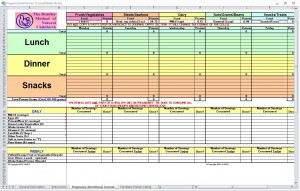
Eating a nutritious, mineral-enriched diet is absolutely pivotal during pregnancy. Although the term “eating for two” tends to be a somewhat overused phrase, for expectant mothers, it’s a mantra worth repeating.
Every morsel a mother consumes acts as direct nutrient stream for her child. And while the stream bears positive effects with a diet choked-full of fibrous foods, produce and protein, the results can be severely problematic in the case with alcohol, fatty foods and tobacco.
One of the most effective tools for ensuring your baby’s nutrient stream stays clean and packed with minerals is to keep close track of your daily eating habits throughout pregnancy. But unlike a typical dieting journal that is geared towards a physical weight-loss goal, a pregnancy diet spreadsheet journal chronicles the intake of crucial nutrients from mother to unborn child.
Major Features of the Pregnancy Diet Spreadsheet
With the Pregnancy Diet Spreadsheet from MyExcelTemplates.com, expectant mothers can effectively:
- Log their daily caloric and nutrient intakes, all from a single, easy-to-use spreadsheet.
- List protein levels for her most commonly-consumed foods. The Pregnancy Diet Spreadsheet contains room for expectant mothers to add customized favorite foods to the nutrient list.
- Map the kinds of produce, dairy, meats and treats she is ingesting. The Pregnancy Diet Spreadsheet contains allotted areas for specific food tracking, and on a daily basis.
3 Kinds of Nutrients To Nurture Your Pregnancy
Although expectant mothers won’t be eyeing a specific weight-loss or physical goal with their eating habits, nutritious food will still play a significant role in a pregnant woman’s dieting regimen.
- Aim for as many folic acids as possible. According to the Mayo Clinic, folate and folic acid play integral roles in preventing various birth defects. Expectant mother should shoot for roughly 800 micrograms a day.
- Crave calcium. Young children have long been encouraged to consume large amounts of calcium to aid in growing bones. Fetuses are no different – mothers should aim for roughly 1,000 milligrams daily.
- Make vitamin D a priority. Along with calcium, vitamin D will aid in the development of your baby’s soft bones and teeth. Opt for a fatty fish (like tuna or salmon). If the notion of mercury frightens you, consider opting for daily intakes of orange juice or fortified milk.
Download: Pregnancy Diet Spreadsheet
Check out this offer while you wait!

